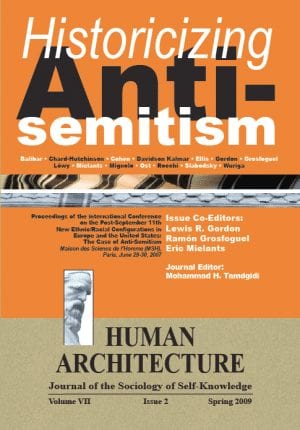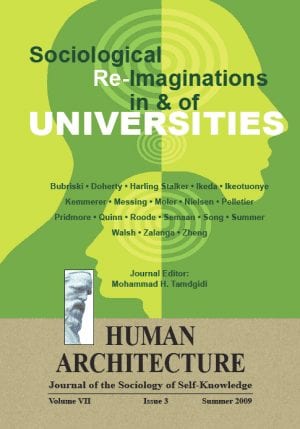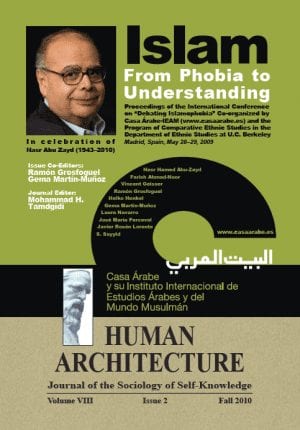Thich Nhat Hanh’s Sociological Imagination: Essays and Commentaries on Engaged Buddhism
$50.00 – $99.00
This Summer 2008 (VI, 3) issue of Human Architecture: Journal of the Sociology of Self-Knowledge is dedicated to an exploration of Thich Nhat Hanh’s Engaged Buddhist philosophy and spiritual theory and practice from a sociological and social scientific vantage point, to highlight the significance his teaching bears for the development of a self-reflective, globally humanist, and environmentally concerned, sociological imagination.

All the sections of this publication can be read online by logged-in members of the OKCIR Library with a valid access. In that case click on any section in the table of contents below, and then click on the large PDF icon at the bottom of that page to access the publication section. Alternatively, you can purchase this publication as offered below.
Description
Thich Nhat Hanh’s Sociological Imagination: Essays and Commentaries on Engaged Buddhism – Plus Proceedings from the Panels on “Buddhist Contributions to Social Justice” at the Fifth International Buddhist Conference on the United Nations Day of Vesak held in Hanoi, Vietnam—May 2008
HUMAN ARCHITECTURE
Journal of the Sociology of Self-Knowledge
Volume VI • Issue 3 • Summer 2008
Journal Editor:
Mohammad H. Tamdgidi, UMass Boston
Description
This Summer 2008 (VI, 3) issue of Human Architecture: Journal of the Sociology of Self-Knowledge is dedicated to an exploration of Thich Nhat Hanh’s Engaged Buddhist philosophy and spiritual theory and practice from a sociological and social scientific vantage point, to highlight the significance his teaching bears for the development of a self-reflective, globally humanist, and environmentally concerned, sociological imagination. Included are several talks, letters, and a poem, by Thich Nhat Hanh on the meaning and practice of Engaged Buddhism—in regard to issues ranging from war and conflict, the environment, food industry and consumption, and history of Engaged Buddhism. Other articles put his views in social science and sociological contexts, specifically exploring the overlapping landscapes of Engaged Buddhism with Pragmatism, Deep Ecology, sociological imagination, and ideological analysis. Other contributions are illustrative of the ways in which Thich Nhat Hanh’s teachings have engaged contexts such as: international conflict; the classroom; urban policing; traumatized populations; economic theory; environmental crisis; and family loss and trauma. A critical commentary by a participant’s experience of attending one of Thich Nhat Hanh’s retreats in 2005 is also included, followed by a response from a representative of the Plum Village community in France. Contributors include: Thich Nhat Hanh, Winston Langley, Michael C. Adorjan, Benjamin W. Kelly, Julie Gregory, Samah Sabra, Darren Noy, Sujin Choi, Marc Black, Samiyeh Sharqawi, Richard Brady, Michael J. DeValve, Cary D. Adkinson, Robert Brian Wall, Glenn Manga, Angela Tam, Karen Hilsberg, Lisa Kemmerer, Bhikshuni Chan Tung Nghiem (Barbara Newell), Robert Andrew Parker, and Mohammad H. Tamdgidi (also as journal editor-in-chief). Human Architecture: Journal of the Sociology of Self-Knowledge is a publication of OKCIR: The Omar Khayyam Center for Integrative Research in Utopia, Mysticism, and Science (Utopystics). For more information about OKCIR and other issues in its journal’s Edited Collection as well as Monograph and Translation series visit OKCIR’s homepage.
The various editions of this issue of Thich Nhat Hanh’s Sociological Imagination: Essays and Commentaries on Engaged Buddhism are also available for ordering from all major online bookstores worldwide (such as Amazon, Barnes&Noble, and others).
Contents
vii—Editor’s Note: Thich Nhat Hanh’s Sociological Imagination
Mohammad H. Tamdgidi, University of Massachusetts Boston
1— Opening Keynote: Asia’s Thich Nhat Hanh
Winston Langley, University of Massachusetts Boston
FROM THICH NHAT HANH
3— “Please Call Me By My True Names”
Thich Nhat Hanh, Plum Village, France
7—Spiritual Reflections on War and Peace: A Talk by Thich Nhat Hanh—Peace Forum, March 19, 2003
Thich Nhat Hanh, Plum Village, France
15—The Environment is You: A Talk by Thich Nhat Hanh—Denver, Colorado, August 29, 2007
Thich Nhat Hanh, Plum Village, France
21—The Flesh of Our Children: Two Letters and Five Contemplations on Food from Thich Nhat Hanh
Thich Nhat Hanh, Plum Village, France
29—History of Engaged Buddhism: A Dharma Talk by Thich Nhat Hanh—Hanoi, Vietnam, May 6-7, 2008
Thich Nhat Hanh, Plum Village, France
ENGAGED BUDDHISM IN SOCIOLOGICAL CONTEXT
37—Pragmatism and ‘Engaged’ Buddhism: Working Toward Peace and a Philosophy of Action
Michael C. Adorjan & Benjamin W. Kelly, McMaster University, Ontario, Canada
51—Engaged Buddhism and Deep Ecology: Beyond the Science/Religion Divide
Julie Gregory & Samah Sabra, Queen’s University, Kingston, Ontario & Carleton University, Ottawa, Canada
67—The Sociological Contexts of Thich Nhat Hanh’s Teachings
Darren Noy, University of California at Berkeley
73—Ideology and Manas
Sujin Choi & Marc Black, University of Massachusetts Boston
SYMPOSIUM:
PROCEEDINGS FROM THE PANELS ON “BUDDHIST CONTRIBUTIONS TO SOCIAL JUSTICE” AT THE FIFTH INTERNATIONAL CONFERENCE ON THE UNITED NATIONS DAY OF VESAK HELD IN HANOI, VIETNAM—MAY 2008
81—Crying From Happiness: Liberating Occupied Minds with Mindfulness
Samiyeh Sharqawi, Palestinian Social Worker, Musmus, Israel
87—Realizing True Education with Mindfulness
Richard Brady, www.mindingyourlife.net
99—Mindfulness, Compassion, and the Police in America: An Essay of Hope
Michael J. DeValve & Cary D. Adkinson, Fayetteville State University
105—Healing from War and Trauma: Southeast Asians in the U.S. —A Buddhist Perspective and the Harvard Program in Refugee Trauma
Robert Brian Wall, Lynn Community Health Center, Lynn, MA
113—Interbeing Autonomy and Economy: Toward Enduring Social and Ecological Justice
Glenn Manga, University of Queensland, St. Lucia, Australia
129—Saving Indra’s Net: Buddhist Tools for Tackling Climate Change and Social Inequity
Angela Tam, Environmentalist and Author, Hong Kong
133—Family as Sangha
Karen Hilsberg, Vesak 2008 Conference Presenter
COMMENTARY AND RESPONSE
135—Engaged Buddhism In Retreat
Lisa Kemmerer, Montana State University
145—Peace in Oneself, Peace in the World: The Real Heart of Engaged Buddhism—A Response to Lisa Kemmerer
Bhikshuni Chan Tung Nghiem (Barbara Newell), Loving Kindness Temple, Plum Village, France
[Editor’s note: For a follow-up to the above dialogue between Lisa Kemmerer and Bhikshuni Chan Tung Nghiem (Barbara Newell), please click as follows to see the further commentary by Lisa Kemmerer in Vol. VII, Issue 3 (Summer 2009) of the present journal.]
149—About the Cover Illustration Artist: Robert Andrew Parker






